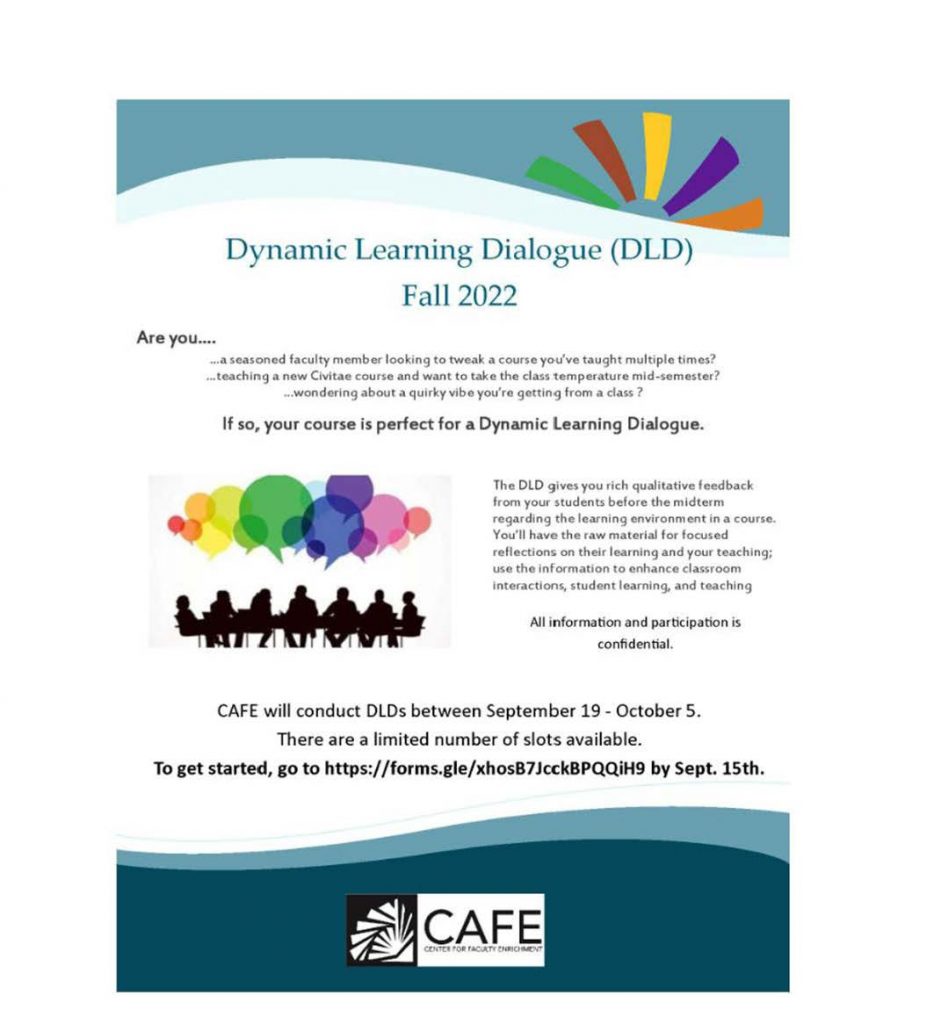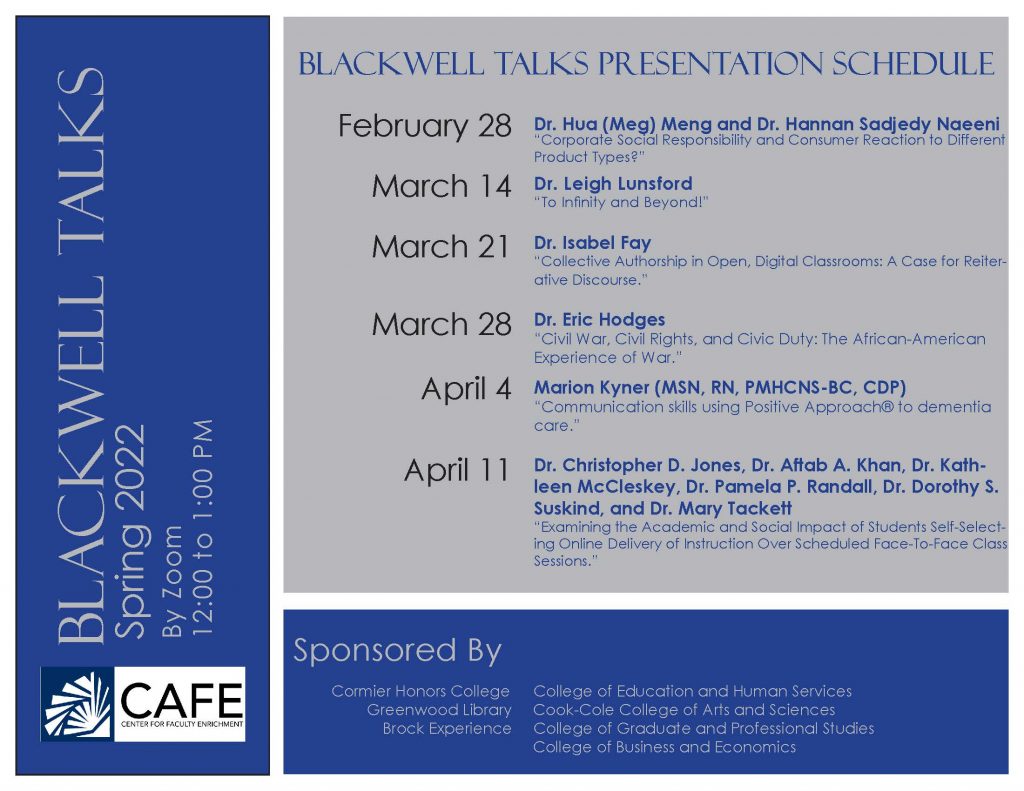Final exam week can be a challenging time for faculty and staff to maintain our wellness. CAFE is offering mini-breaks and healthy activities for mind, body, and soul. Here is the full list of events:
Win some wellness raffles
Every time you attend one of the wellness activities listed below, your name will be entered in a raffle for a plethora of gift cards and apparel. Prizes have been donated by Barnes and Noble, Press Club, Weyanoke, 119, and Greens to Go (Aramark).
Aramark is also providing two “gift bags” filled with wellness items. For any faculty or staff member that purchases a new or additional meal plan between now and December 31st will be entered to win the bags. Purchasing a Block 10 plan (10 meals) will get them 1 chance for the bags. Purchasing a Block 40 plan (40 meals) will get them 4 chances for the bags. Since Faculty and Staff meal plans don’t expire, any blocks purchased will add up and be there until used.
Difficult moments of choice: Strategies for Mindfulness and “Wise Minds” for Educators
Facilitator: Jenny Retallick, Assistant Director of Well-Being Programming, Licensed Clinical Psychologist
Date: Wednesday, December 1st from 3-4:30pm
Register@: https://forms.gle/FYsycNDFkXmeKzMm6
At this point in the semester, your needs and your students’ needs might be in dialectical tension. We are tired, yet they need more of our time and we have end of semester course and service responsibilities. How do we balance our own wellness with the increase in student needs? Using Dialectical Behavioral Therapy and real life examples, we will discuss strategies and tools you can use to increase the likelihood of maintaining your wellness during stressful periods.
Wellness Bags
Sponsor: Aramark and the College of Business and Economics
Date: Starting on December 6th until they’re gone
Location: CAFE Lounge, Allen 310
The Longwood Dining Wellness Bags are a wholesome way to get started with some healthy snacks. These health conscious snacks include snack bars that are packed with nutrients, protein, and fiber, as well as whole fruit and heart healthy cereals. Also included will be Faculty/Staff meal plan information to support those health conscious professionals on campus that want healthy options right here on campus.
Chair massage
Sponsor: Greenwood Library
Massage Therapist: Amy Nelson
Dates: Tuesday, December 7th, 9 am-12 pm & Wednesday, December 8th, 8 am-12 pm
Location: Greenwood Library Room 147
Come to the Library for a 12-minute chair massage from licensed massage therapist Amy Nelson! Space is limited to registration is required.
Yoga for faculty and staff
Instructor: Eleanor Kent
Date: See options below
Location: Fitness Center’s Group Exercise Room (membership not required)
Zoom: https://longwood-edu.zoom.us/j/97720047384?pwd=ZEg1c1FBUlo0azJtYUIvL2pSVVV1dz09
Eleanor Kent teaches yoga designed for all ability levels: she will coach you through different levels of each pose or exercise to accommodate a wide range of physical conditioning. The class on Thursday is chair yoga—no need to get up and down or wear any special clothes.
- Monday, December 6th, 2:00-3:00 pm | Fitness Center, Group Fitness room
- Thursday, December 9th, 2:00-3:00 pm Chair Yoga |Fitness Center. Room 307
- Friday, December 10th, 4:00-5:00 pm | Fitness Center Group Fitness room
Meditation for faculty and staff (New meditators)
Guide: Renee Gutiérrez
Date: 10:45-10:55 am, December 6th-10th
New to meditation? Wondering what it’s all about? Join Renee Gutiérrez to get a start on this healthful, mindful practice. These starter sessions last for 10 minutes, no registration required.
Meditation for faculty and staff (Established meditators)
Guide: Renee Gutiérrez
Date: 11:00-11:20am, December 6th-10th
Location: CAFE Lounge, Allen 310
Zoom: https://longwood-edu.zoom.us/j/97720047384?pwd=ZEg1c1FBUlo0azJtYUIvL2pSVVV1dz09
Already have an established meditation practice? Join in with others to help your accountability during a busy week. You can meditate in person or via Zoom. Sessions last only 20 minutes, and no registration is required.
Grading Pomodoros
Facilitator: CAFE Staff
Date: See options below
Location: CAFE Lounge, Allen 310
Zoom: https://longwood-edu.zoom.us/j/97720047384?pwd=ZEg1c1FBUlo0azJtYUIvL2pSVVV1dz09
Faculty, join CAFE staff in person or via Zoom to work on your grading during finals week. Grade in community, using the pomodoro technique by Francesco Cirillo that encourages productivity.
- Tuesday, December 7th, 2:00-3:30pm with Adam Franssen
- Wednesday, December 8th, 6:30-8:00pm with Pam Tracy
- Thursday, December 9th, 9:00-10:30am with Renee Gutiérrez
- Friday, December 10th, 2:00-3:30pm with Renee Gutiérrez
Walk High Bridge Trail for faculty and staff.
Facilitator: Renee Gutiérrez
Date: Wednesday, December 8th, 2:00-3:00 pm
Location: High Bridge Trail
Registration: https://forms.gle/Wiosmt3wmypjatbX6
Join Renee for some exercise as you appreciate the natural beauty of the High Bridge Trail. Walk as far as you like, at your pace or with others. We’ll gather at the Main Street LOVE sign at 2:00 pm.
Research Focus Symposium – Save the Date!
Day 1 – Wednesday, January 5th
Day 2 – Thursday, January 6th
CAFE is pleased to announce our 2nd annual pre-spring semester symposium. This year’s event is designed to help advance your research agenda, whether you’re just starting out or looking to publish your work. We’ve invited area experts to facilitate 10 research-related workshops. This year’s topics are: developing your research agenda, using institutional data, conducting research with students, following IACUC/IRB guidelines, SOTL, publishing, copyright, and grant writing. The symposium will conclude with a 2-hour session to implement what you’ve learned and plan a productive semester of research. All sessions will be available on Zoom. We hope you’ll join us!
Promotion and Tenure Portfolio Workshops
Professional Portfolio Writing Session
Facilitator: Adam Franssen, Assistant Director of CAFE
Date: Thursday, December 2nd from 3:30-5pm
Location: Allen 310 w/ Zoom option
Register@: https://forms.gle/sFxv5Q3cTLYZRU9e7
This 90 minute writing session is time designated for all first year tenure track faculty, clinicians, honors faculty, lecturers, and librarians to work on their portfolios before the December 9th submission date. During this time, participants will write their professional portfolios in community, using the pomodoro technique. CAFE provides space, snacks, and stress relief items. A CAFE staff member will also be present to consult if participants would like to discuss their writing to get past obstacles to completion of their work.


